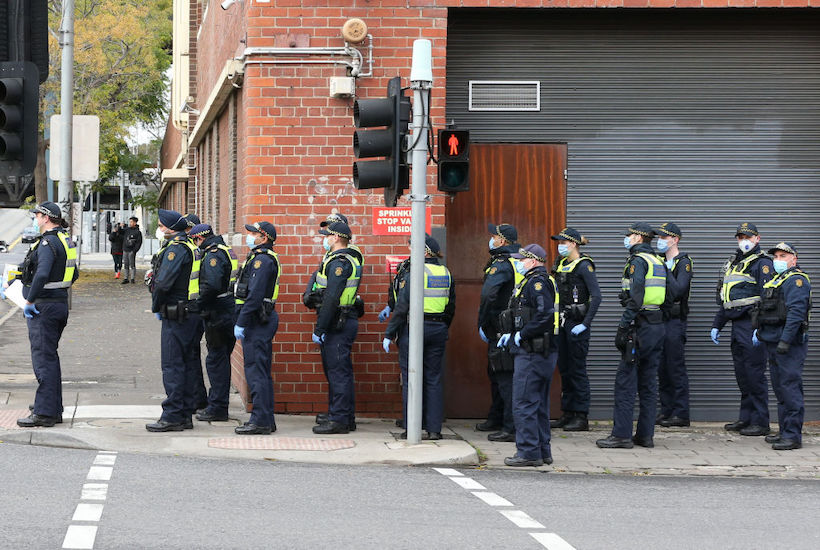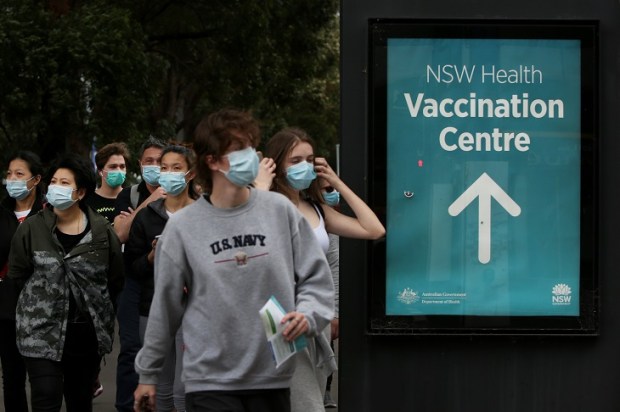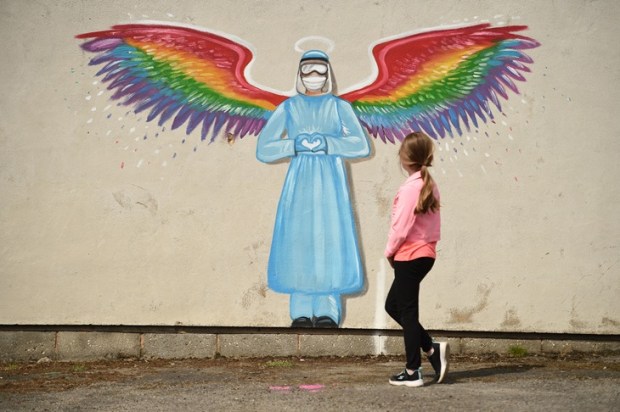On Monday, a Newspoll published in The Australian put the Coalition Government and the Labor tied on 50-50 support on a two-party preferred basis. This outcome represents the biggest fall in support for the government since the start of the coronavirus crisis. The same poll also showed that, of those surveyed, 80% support the right of Premiers to close their borders. On Tuesday, The Australian published second Newspoll which showed that 70% of those surveyed believed Scott Morrison was a “strong and decisive” leader, as compared with a 47% outcome for opposition leader, Anthony Albanese.
In response to this, one could rightly argue that, after the 2016 American Presidential election, and the Australian federal election in 2019, polls are not to be trusted. Further, “beauty contest polls” (preferred prime minister, which leader is more “decisive” and so forth), are inaccurate measures of electoral support. Julia Gillard as prime minister was consistently ahead of Tony Abbott in the preferred prime minister contest in major polls (including Newspoll), yet the then Labor government consistently trailed the Liberal-National Opposition on a two-party preferred basis in the same polls.
What is more, Monday’s Newspoll could be a one-off. However, if the polls continue to be close between the government and opposition, it may just be that the ‘quiet Australians’ are finally realising that the Prime Minister who said the 2019 election victory was for them has actually forgotten them. His “decisiveness” might actually be perceived to be “authoritarianism”, where panic has overtaken good policy and failed the Australian public, who have been spooked into meekly accepting an extreme response to a pandemic that has been far less deadly than feared, with the dire consequences of this approach now being realised.
At the time of writing, coronavirus-related deaths in Australia were 652. As many have pointed out, this number is nowhere near the deaths caused by a bad flu season (Australia recorded 1257 flu deaths in 2019, which was considered by many “experts” to be a bad flu season), or those resulting from car accidents, or heart disease, or cancer. I could go on. What is now becoming apparent is that the corona infection rate is 0.3% and its death rate is 0.01%, with the vast majority of these being people aged over 80. This is far smaller when compared to other pandemics, such as the 14th Century Bubonic Plague (where the death rate was 1 in 3) and the 1918-1919 Spanish Flu (where the estimates of death range between 40 to 50 million, many of whom were women of childbearing age). However, the corona death rate is now coming under increasing scrutiny, which is why at the start of this paragraph I used the words “coronavirus-related deaths”. As Adam Creighton reported in Tuesday’s Australian, the US Centre for Disease Control and Prevention said only a fraction of US deaths from or with COVID-19 were attributed solely to coronavirus. “For 6 per cent of the US deaths, COVID-19 was the only cause mentioned. For deaths with conditions or causes in addition to COVID-19, on average, there were 2.6 additional conditions or causes per death,” it said. In other words, the corona death rate should actually be revised down.
As far back as August 8, Newsweek reported that a Mississippi county coroner, Joshua Pounder, said his state’s death count could be incorrect, telling residents that possible misreporting has led to “unnecessary fear in the public”. The article recount how in DeSoto County, despite the ongoing coronavirus pandemic, the coroner’s office recently completed reports for 144 deaths in July. Pounder attributed the highest number of deaths to heart conditions, lung or vascular diseases and strokes, with 67 reported deaths. Pounder wrote that cancer was the second-highest, causing 30 reported deaths in the county. Of the 11 causes of death he listed, coronavirus was not among them. Instead, the 24 DeSoto County residents who had a positive COVID-19 test at the time of their death were included in the count of total deaths and attributed to causes other than the novel coronavirus.
“All of the individuals who have died that were [positive] for COVID at some point have all had major medical problems prior to contracting COVID”, Pounder wrote, adding that the majority of them were older than 75 and many of the people who died already had a terminal diagnosis of some kind. However, the Mississippi State Department of Health “demands” that anyone who has a positive coronavirus test at the time of their death is reported as a “COVID death” without acknowledging the fact that “many of them were terminal prior to a [positive] test],” he continued, adding that this misrepresentation that has caused “unnecessary fear in the public” and significant stress. The coroner stated that cardiovascular and pulmonary deaths were “drastically up” in DeSoto, which Pounder attributed to stress caused by the pandemic and fear caused by listening to politicians and news reporters give “false information”.
Last week, the inaccuracy identified above in counting coronavirus-related deaths was confirmed as having been the practice followed in Australia. In his daily coronavirus briefing on Friday, August 28, Victorian Chief Medical Officer Dr Brett Sutton, said this about the number of deaths: “Anyone who is a confirmed case who dies is classified as a coronavirus death. It doesn’t have to be definitively from coronavirus, and in some instances, you know, in aged care, there would have been some residents who would have already been receiving palliative care who became infected with coronavirus”.
This statement however, and those made by Joshua Pounder, have received little to no coverage in the Australian mainstream media. As Adam Creighton noted in his article, perhaps Victorians’ authoritarian tendencies have arisen from extreme — and unjustified — fear of the coronavirus. As he wrote: “Even in nations that didn’t mandate tough lockdowns, such as Sweden, economic activity and movement collapsed. In Britain and Sweden, the public thinks 6 per cent to 7 per cent of the population has died, which would be 3.6 million and 600,000 people, respectively. The figures are 41,500 and 5,800. Interestingly, Sweden’s overall mortality for this year, adjusted for population size, is barely distinguishable from previous years”.
More critically, what is also being ignored is that, based on the evidence available, some of which I have alluded to above, the appropriate policy to fight the coronavirus should be focused on protecting the most vulnerable – those who are very old or suffering from chronic illness. Several leading epidemiologists around the world have been arguing this case for quite some time, advising that lockdowns are an unnecessary and gross overreaction that will do more harm than good. For example, Professor Mark Woolhouse, epidemiologist at Edinburgh University and adviser to the British government told The Sunday Express on August 24 that attempting to control coronavirus through lockdown measures is a “monumental mistake”. Not only do these lockdowns constitute an unnecessary panic but, according to the professor, “history will say trying to control COVID-19 through lockdown was a monumental mistake on a global scale, the cure was worse than the disease”.
A similar opinion has been expressed by Dr David L. Katz, founding director of Yale University’s Yale-Griffin Prevention Research Center and former president of the American College of Lifestyle Medicine. As early as March 20 Dr Katz, in an opinion piece for The New York Times, warned that extreme measures to fight coronavirus “may end up being worse than the disease”. He stated that the “unique” nature of corona is that it results in only “mild” symptoms in 99 per cent of cases and that it appears to only pose a high risk to the elderly”. According to Dr Katz, it is deeply concerning that “the social, economic and public health consequences of a near-total meltdown of normal life – schools and business closed, gatherings banned – will be long-lasting and calamitous, possibly even graver than the direct toll of the virus itself.” Economies will bounce back in time, he says, “but many businesses never will. The unemployment, impoverishment and despair likely to result will be public health scourges of the first order.”
Katz and Woolhouse are not alone. On Tuesday, senior doctors across Melbourne urged politicians not to support a state of emergency extension, saying the move threatens to “destroy” the health and wellbeing of fed-up Victorians. Box Hill Hospital urologist Dr Geoff Wells told NCA Newswire that in a letter to Premier Daniel Andrews, he and 12 other medical practitioners outlined their concerns about the Victorian Government’s response to the COVID-19 pandemic. He hoped the letter would convince the government to lift harsh stage four restrictions on September 13.
“When I see my patients and ask them how they’re coping, the number one response is the sadness at not being able to see their grandchildren for three, four or five months and the ones who live on their own are extremely isolated,” he said. “The mood of the population has changed dramatically in the past two weeks – there seems to be one half that is getting angrier and angrier and the other half which has just lost all hope – these policies are effecting the general psyche of the community. We just want to have significant input into this response instead of a blanket approach that is harming the general population.”
In the letter, the doctors said specialist referrals from GPs had fallen dramatically as a result of patients fearing they would get sick if they went out. “As a direct consequence of this delay, many will have poorer prognoses. This has especially been the case with three consultants who treat cancer,” they wrote in the letter. “We now know that whilst COVID-19 is highly contagious, it is of limited virulence. We are told that since March 2020, 565 Victorian patients have died either with or from the virus (numbers as at 31 August). This compares with annual Victorian deaths of approximately 10,000 patients with cardiovascular disease and 11,000 with cancer.”
The doctors continued: “Accordingly, the COVID-19 deaths are a relatively small proportion of the 114 deaths per day that are normally seen in Victoria. In comparison, since the start of March COVID-19 has been associated with 3 of the 114 deaths per day. Most of the 565 deaths have occurred in nursing homes which according to doctors currently working in this environment have described causal factors related not only to the virus but to other care related issues, including isolation, loneliness, and related diminished nutritional intake.” The letter also states, tellingly: “Since June 2020, the death rate has risen sharply in aged care facilities where the risk of transmission of COVID-19 has been unacceptably high. However, the government, and the doctors advising it, have not reviewed their policy in order to focus on this vulnerable segment of the population. Instead, stage 3-4 lockdowns for the whole community have continued for no apparent scientific reason.”
It is time all Australian governments started listening to different medical practitioners and scientists, instead of their unelected health commissars, and do something radical: tell the Australian people the truth. By not following a strategic, targeted approach as outlined by the likes of Drs Katz, Wells, et. al., what has now become apparent is that the Prime Minister and his government have failed to protect the most vulnerable, with considerable evidence emerging from the Aged Care Royal Commission the Federal Government failed miserably at developing policies to protect residents of nursing homes, where the highest incidence of death from or with coronavirus has occurred.
It might be within the realms of possibility that Monday’s Newspoll has frightened some Coalition parliamentarians in both the federal and state spheres. New South Wales Deputy Premier John Barilaro told the media the same day that a looming “economic crisis” could ultimately prove worse than coronavirus deaths in Australia. “We’re in the middle of a health crisis but what is looming is bigger, an economic crisis”, he said. “Not many politicians want to stand here in front of a camera and say that … while we deal with the many deaths of the COVID pandemic my fear is the number of deaths that will come from the economic crisis.” Barilaro added: “The suicide rate [and] mental health, they’re the issues we will face today but also the months and years ahead. And so we have an economic crisis on our doorstep, and we must balance between health and economics to find a better balance for our communities.” Barilaro’s words in relation to a looming economic crisis were confirmed on wednesday, when it was announced that Australia had officially entered into a recession for the first time in 30 years, with the economy contracting for the second consecutive quarter. In the June quarter the result was a 7% fall in GDP, the most severe economic downturn since the Second World War.
Barilaro also referred to the State border closures, which were hitting the agricultural sector in a particular way, since it had just been recovering from drought. These border closures have resulted in the death of an unborn child on last week, when a pregnant mother resident in northern New South Wales, near the Queensland border, was not able to receive medical attention at the hospital closest to her in Queensland. This tragic incident has seen the Prime Minister and his fellow Ministers, after months of effective acquiescence on border closures in the name of “national leadership unity”, finally condemn the States for enacting a policy which is not supported on any scientific basis. In fact, the scientific evidence is that borders should be open. There will be more tragedy to come, since these border closures are applied inconsistently and unfairly. Families are separated, fuelling a mental health crisis, yet at the same time 300 people were allowed into Queensland for the AFL final series in September.
Monday’s Newspoll may well be an aberration, but it is also a cause for concern, not just for the Coalition, but more so for our system of responsible government. The poll results show that a majority of those surveyed state they believe a Prime Minister is “decisive”. This is the same Prime Minister who has refused to criticise, and indeed supported, Premiers who have imposed authoritarian measures when it has become increasingly clear that a more strategic approach is required. Therefore, what this poll might actually suggest is that people have developed a servile mindset with unquestioning faith in government. With this comes a lack of appreciation of fundamental rights and freedoms that are a cornerstone of responsible democratic, constitutional government. That is the real cause for concern.
Dr Rocco Loiacono is Senior Lecturer at Curtin University Law School.
Got something to add? Join the discussion and comment below.
Get 10 issues for just $10
Subscribe to The Spectator Australia today for the next 10 magazine issues, plus full online access, for just $10.


























Comments
Don't miss out
Join the conversation with other Spectator Australia readers. Subscribe to leave a comment.
SUBSCRIBEAlready a subscriber? Log in